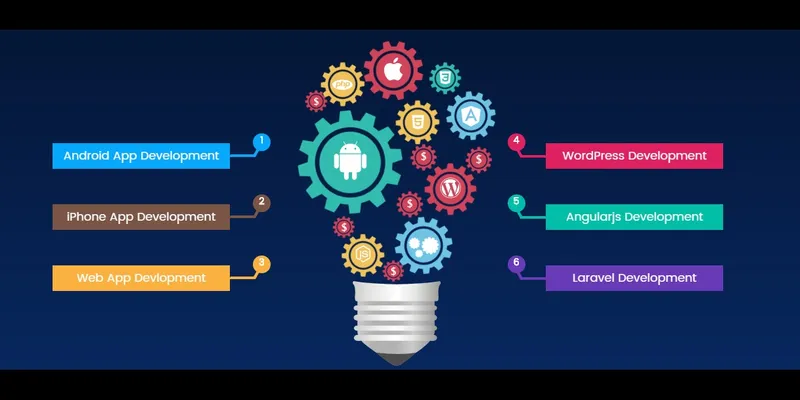

Top 7 web development frameworks
Web & Mobile App Development
As a web developer, you might possess an Athenaeum of preferred web development frameworks. But if you are amongst the one who along with personal comfort looks for the latest trends, so as to move at the momentum parallel to technology, you need to be aware of the latest web development technologies and new web development frameworks and eventually implement them. Therefore, here we present the list of time and trend friendly frameworks with their respective pros and cons.
DJANGO
Django is an avant-garde and out of the box open source framework, congenial up to Python version 3.4. It’s armed with templates, server side, and admin panel, so as to form the website without any rephrasing of the code. It also restrains you from using third party framework to figure a poignant website. Moreover, Django uses model template view to separate logic and views. Django has also been exercised by thousands of medium web sites and startups for its receptiveness, sufficient functionality, and good documentation.
ADVANTAGES:
Ease of ORM Object Rational Mapper to map projects with the database table.
It’s common database engines (MySQL, PostgreSQL, SQLite, Oracle, SQL Server, DB2 and others with additional drivers), makes migration between them very simple.
Self-equipped with lightweight development server.
DISADVANTAGES:
Because of its concentrated development speed, it’s crucial to integrate new shiny buzzwords into the system.
A mammoth framework
Comparatively, large structure even if on making a simple landing page.
Complex
Ruby on Rails developer
Ruby on Rails (RoR)
RoR was spawned to make the coding of web-based applications Elementary and agile. RoR clips a fundamental rule: Convention over Configuration. Rails is a helpful tool for professionals to construct varied web applications.
ADVANTAGES:
Convention over configuration gives the ease to write much less code.
Rails provide default structure for the database, the web service, and web pages.
Easy to use relational and non-relational database engines with drivers originally included.
DISADVANTAGES:
A lot of to learn for first-time users
Ruby requires more server capacity and resources.
EXPRESS
Express.js is an open-source framework for Node.js to form simple web applications with server side and API. It’s a canonical server framework for projects which use javascript. PayPal and MySpace are its users.
ADVANTAGES:
Uncomplicated interface to create websites and web apps.
It is very pliable and pluggable.
DISADVANTAGES:
Requires installation of additional libraries and packages for effective development.
Compatibility issues.
A single computation blocks other computation requests until completed.
ANGULARJS-4.2
ANGULAR
An open-source framework designed for single-page web apps and mobile app development, using MVC architectural motif. Angular is an evolution of AngularJS and a completely new framework. You can use it for common websites or landing pages, but not for those ones you want to see on top of Google or Yahoo search. It’s not SEO friendly.
ADVANTAGES:
Uses dynamic data to create a web application as opposed to the static HTML web site.
Based on components (stored in modules) which define what the web page will display.
Can easily link as many components as needed to a web page by alternating different custom tags.
Provides online update view for events, logic stored in component and changed data.
DISADVANTAGES:
Zero backward compatibility to Angular 1.x
One needs to get accustomed to typescript first, before using it.
It is not SEO friendly.
REACT
React is devised and backed by Facebook. Although React is not a full-stack framework, it ensures only View-level (templating language) and certain callback functions to interpose HTML code, it’s a powerful front end tool.
ADVANTAGES:
Compatible tool for fast view renders.
React allows to re-render one element of the whole set of DOM elements
Compatible with Virtual DOM.
Freedom to build whole HTML page with each element as a single component (buttons, headers, check boxes, lists, tables etc) defining their view and behavior in corresponding js files.
DISADVANTAGE:
Not possible to create a powerful application with the full-featured server side.
The complexity involved in moving complex designs from Photoshop or any sketch to JSX files.
VUE.js
Vue is a JavaScript library that ensures a View Model layer of MVVM pattern. It connects a model and a view and thus provides two-way data binding. Vue is an open source developed and supported by the community.
ADVANTAGES:
One of Vue’s most significant attribute is its reactivity
Too friendly for designers and easy to read.
Fast UI development.
DISADVANTAGES:
Minimal features “in the box”
Less of documentation and plugins in comparison to competitors.
METEOR
Meteor is a full-stack framework which makes use of javascript both for the front end and for backend designs, for developing real-time applications for web and mobile. One simply needs to build a normal web application with Meteor and it is automatically real time. It works on Node.
ADVANTAGES:
A front-end developer can easily work on the back-end with Meteor without switching between Ruby/Python/PHP or any other languages.
One code is supported on a client and a server both.
No need to use REST to get data.
Provides real time update.
Meteor has complete autonomous app compiler.
DISADVANTAGES:
Additional node modules are needed while developing, and so it will be necessary to pay attention to their updates and compatibility.
It only works well with Mongo DB DDP and not with anyone else.
Has to be used for the whole app, and not just for front or backend.
WEB DEVELOPMENT FRAMEWORKS

Concetto Labs provides high-quality mobile application development as well as competitive web development frameworks through the use of latest technologies. We provide a one stop solution for all IT related services.






